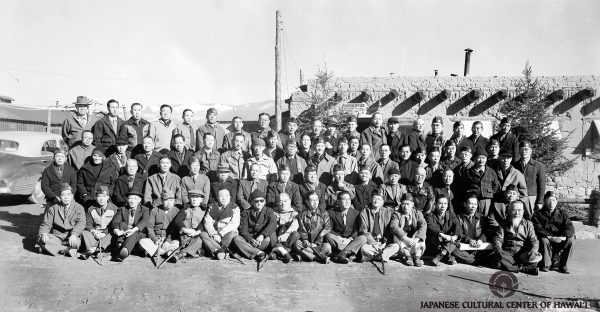Group Media & Photos

Hawaii internees in front of the Liaison Office at the Santa Fe Internment Camp, New Mexico, January 1945. Front row (L-R): Kumaji Furuya, Shujiro Takakuwa, Mankichi Goto, Chosuke Kayahara, Suekichi Oka, Nisshu Kobayashi, Shuji Mikami, Sadasuke Hamamoto, Konin Matano, Isaku Orita, Makitaro Tamura, Minosuke Hanabusa, Giichi Sasaki, Ryosen Yonahara, Tomiji Kimura, Ninryo Nago, Shin Yoshida. Row 2: Katsuichi Tanaka, Yasuemon Miki, Ryoichi Tanaka, Hatsutaro Toyofuku, Toshio Iinuma, Masaichi Hirashima, Tamaichi Tanaka, Uemon Ida, Kinai Ikuma, Hanzo Shimoda, Yoshizo Ishikawa, William Toka Ida, Katsuichi Kawamoto, Daizo Sumida, Aisuke Shigekuni, Sadato Morifuji. Row 3: Takegoro Kusao, Setsuzo Toyota, Jinshichi Tokairin, Hidekichi Nakamoto, Gendo Okawa, Joei Oi, Yasutaro Soga, Zensuke Kurosawa, Tsunetaro Harada, Tamaki Arita, Hego Fuchino, Kogan Yoshizumi, Osuke Shigemoto, Hakuai Oda, Shinri Sarashina, Yoshinobu Sasaki, Unknown, Seiichi Fujii, Tokikichi Sugimoto, Shuntaro Ikezawa, Goki Tatsuguchi, Suekuma Takaki. Back row: Unknown, Suijo Kabashima, Koichi Iida, Sawajiro Ozaki, Shoho Fujiie, Unknown, Shigeki Mizumoto, Soichi Obata, Muneo Kimura, Yukihide Kohatsu, Tomoichi Hayashi, Kakujiro Nishiki, Takeo Miyagi, Josen Deme, Gikyo Kuchiba, Eita Sato, Ryuichi Kashima, Hideyuki Serizawa, Kinzo Sayegusa. JCCH/Rev. Hakuai Oda Collection.
Internment Locations
Arrested: December 1941
Sand Island Internment Camp, Honolulu, Oahu Island
A group of 172 Hawaii men (mostly Issei) was sent aboard the military transport ship USS U.S. Grant for incarceration in U.S. Army and Department of Justice camps on the Mainland. Together, the men were sent from camp to camp.
In June 1943, this transfer group was split into two, with this group sent from Camp Livingston to Fort Missoula before being transferred to the Santa Fe Camp.
From there, some internees were paroled to War Relocation Authority camps, where they were reunited with family members under confinement. Others were transferred for repatriation to Japan.
Angel Island Detention Facility, California
March 1942
Camp McCoy Internment Camp, Wisconsin
March 1942 - May 1942
Camp Forrest Internment Camp, Tennessee
May 1942 - June 1942
Camp Livingston Internment Camp, Louisiana
June 1942 - June 1943
Fort Missoula Internment Camp, Montana
June 1943 - April 1944
Santa Fe Internment Camp, New Mexico
April 1944 - October 1945
Returned to Hawaii: November 1945
Arrived in Honolulu with 450 other internees aboard the military troopship the Yarmouth.
Jinshichi Tokairin was by the outbreak of World War II a successful businessman in Honolulu. He was the owner of the Tohoku Hotel on Beretania Street and the Nuuanu Onsen Teahouse in the valley of the same name. He was an executive officer in some of the most prominent community organizations of the day: the United Japanese Society, the Japanese Benevolent Society (which oversaw the funding for and development of what would later be known as Kuakini Hospital), and the Honolulu Japanese Hotel Association.
The oldest Japanese organization in the islands, the Hotel Association included some one dozen innkeepers who also led sightseeing tours to Japan. In 1938, the group sponsored a trip led by Tokairin to China, Manchuria, and Korea to provide gifts and support to Japanese imperial forces in the occupied lands. Other members of the Hotel Association who also were incarcerated included Tokuji Baba, Sukeichi Koide, Yuichi Nakamura, and Ichiro Sato.
During World War II, two of Tokairin's sons served in the U.S. military. Hideo Tokairin was inducted into the army in late 1941 and was a member of the 100th Infantry Battalion. He was wounded in action in fall 1943 and was awarded the Purple Heart. Bert S. Tokairin was a member of the army's Military Intelligence Service. He would later become a federal magistrate.
